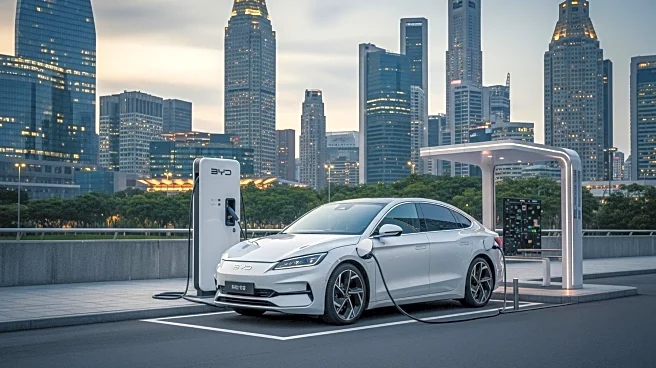What's Happening?
BYD has announced the departure of its 8th Ro-Ro (roll on-roll off car carrier) ship from the Xiaomo International Logistics Port in Shenzhen, carrying over 6,000 vehicles to Singapore. This shipment is part of BYD's strategy to dominate the Singapore automotive market, where it has already become the top-selling automaker. In 2024, BYD sold 6,191 vehicles in Singapore, surpassing Toyota in overall vehicle sales. In the first half of 2025, BYD continued its lead with 4,667 vehicles sold, marking an 80.4% year-over-year increase. The company is also expanding its presence in commercial vehicles with contracts for autonomous buses.
Why It's Important?
BYD's expansion in Singapore is significant as it reflects the growing demand for electric vehicles in the region. Singapore's policies supporting electrification, such as the ban on diesel cars and high taxes on internal combustion engine vehicles, have facilitated BYD's market penetration. The company's success in Singapore could serve as a model for other Southeast Asian countries, potentially accelerating the region's transition to electric vehicles. This shift not only impacts the automotive industry but also contributes to environmental sustainability efforts.
What's Next?
BYD is poised to further increase its market share in Singapore, especially with upcoming changes in tax rebates for electric vehicles. The Early Adopter rebate and Enhanced Vehicular Emission Scheme are set to be reduced, which may prompt a rush in vehicle purchases before the changes take effect. By 2030, Singapore plans to phase out incentives and implement a ban on internal combustion engine vehicles, positioning BYD to lead in a fully electrified market.
Beyond the Headlines
The developments in Singapore highlight the broader trend of electrification in urban areas, where reducing congestion and emissions are critical. BYD's success could influence other automakers to prioritize electric vehicle production and adoption in similar markets. Additionally, Singapore's approach to vehicle taxation and incentives may inspire policy changes in other countries aiming to reduce their carbon footprint.








